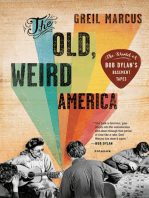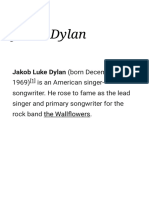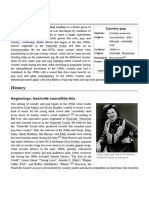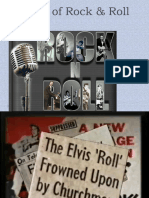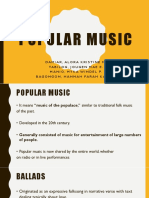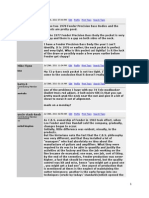22222
22222
Uploaded by
ElenaCopyright:
Available Formats
22222
22222
Uploaded by
ElenaCopyright
Available Formats
Share this document
Did you find this document useful?
Is this content inappropriate?
Copyright:
Available Formats
22222
22222
Uploaded by
ElenaCopyright:
Available Formats
Bob Dylan
Bob Dylan plays a guitar and sings into a microphone.
Dylan at Azkena Rock Festival in Vitoria-Gasteiz, Spain, in June 2010
Born Robert Allen Zimmerman
May 24, 1941 (age 77)
Duluth, Minnesota, U.S.
Residence Malibu, California, U.S.
Other names
Elston Gunnn Blind Boy Grunt Bob Landy Robert Milkwood Thomas Tedham Porterhouse
Lucky Wilbury Boo Wilbury Jack Frost Sergei Petrov
Occupation
Singer-songwriter artist writer
Years active 1959�present[1]
Home town Hibbing, Minnesota, U.S.
Spouse(s) Sara Dylan
(m. 1965; div. 1977)
Carolyn Dennis
(m. 1986; div. 1992)
Children 6, including Jesse and Jakob Dylan
Awards Nobel Prize in Literature (2016)
(For others, see List)
Musical career
Genres
Folk blues rock gospel country pop standards
Instruments
Vocals guitar keyboards harmonica
Labels
Columbia Asylum
Associated acts
Joan Baez The Band Johnny Cash Grateful Dead George Harrison Mark Knopfler Tom
Petty and the Heartbreakers Traveling Wilburys
Website bobdylan.com
Bob Dylan (born Robert Allen Zimmerman, May 24, 1941) is an American singer-
songwriter, author, and artist who has been an influential figure in popular music
and culture for more than five decades. Much of his most celebrated work dates from
the 1960s, when he became a reluctant "voice of a generation"[2] with songs such as
"Blowin' in the Wind" and "The Times They Are a-Changin'" which became anthems for
the Civil Rights Movement and anti-war movement. In 1965, he controversially "went
electric", branching out from his earlier work and alienating some fans of the
American folk music revival, recording a six-minute single, "Like a Rolling Stone,"
which enlarged the scope of popular music.
Dylan's lyrics incorporate a wide range of political, social, philosophical, and
literary influences. They defied existing pop-music conventions and appealed to the
burgeoning counterculture. Initially inspired by the performances of Little Richard
and the songwriting of Woody Guthrie, Robert Johnson, and Hank Williams, Dylan has
amplified and personalized musical genres. In his recording career, Dylan has
explored many of the traditions in American song�from folk, blues, and country to
gospel, and rock and roll, and from rockabilly to English, Scottish, and Irish folk
music, embracing even jazz and the Great American Songbook. Dylan performs on
guitar, keyboards, and harmonica. Backed by a changing lineup of musicians, he has
toured steadily since the late 1980s on what has been dubbed "the Never Ending
Tour." His accomplishments as a recording artist and performer have been central to
his career, but his songwriting is considered his greatest contribution.
Following his self-titled debut album in 1962, which mainly consisted of
traditional folk songs, Dylan made his breakthrough as a songwriter with the
release of the 1963 album The Freewheelin' Bob Dylan, featuring "Blowin' in the
Wind" and the thematically complex composition "A Hard Rain's a-Gonna Fall,"
alongside several other enduring songs of the era. For many of these songs he
adapted the tunes and sometimes phraseology of older folk songs. Dylan went on to
release the politically charged The Times They Are a-Changin' and the more
lyrically abstract and introspective Another Side of Bob Dylan in 1964. In 1965 and
1966, Dylan encountered controversy when he adopted the use of electrically
amplified rock instrumentation and in the space of 15 months recorded three of the
most important and influential rock albums of the 1960s, Bringing It All Back Home,
Highway 61 Revisited and Blonde on Blonde.
In July 1966, Dylan withdrew from touring after being injured in a motorcycle
accident. During this period he recorded a large body of songs with members of the
Band, who had previously backed Dylan on tour; these were eventually released as
the collaborative album The Basement Tapes in 1975. In the late 1960s and early
1970s, Dylan explored country music and rural themes in John Wesley Harding,
Nashville Skyline and New Morning. In 1975 Dylan released the album Blood on the
Tracks, which many saw as a return to form, followed by the critically and
commercially successful Desire the following year. In the late 1970s, Dylan became
a born-again Christian and released a series of albums of contemporary gospel
music, such as Slow Train Coming, before returning to his more familiar rock-based
idiom with Infidels. Dylan's major works during his later career include Time Out
of Mind, "Love and Theft" and Tempest. His most recent recordings have comprised
versions of traditional American standards, especially songs recorded by Frank
Sinatra.
Since 1994, Dylan has published seven books of drawings and paintings, and his work
has been exhibited in major art galleries. Dylan has sold more than 100 million
records, making him one of the best-selling music artists of all time. He has also
received numerous awards including eleven Grammy Awards, a Golden Globe Award, and
an Academy Award. Dylan has been inducted into the Rock and Roll Hall of Fame,
Minnesota Music Hall of Fame, Nashville Songwriters Hall of Fame, and Songwriters
Hall of Fame. The Pulitzer Prize jury in 2008 awarded him a special citation for
"his profound impact on popular music and American culture, marked by lyrical
compositions of extraordinary poetic power". In May 2012, Dylan received the
Presidential Medal of Freedom from President Barack Obama, and, in 2016, he was
awarded the Nobel Prize in Literature "for having created new poetic expressions
within the great American song tradition".[3]
You might also like
- Bob Dylan All The Songs The Story Behind Every Track by Margotin Philippe, Guesdon Jean-MichelDocument922 pagesBob Dylan All The Songs The Story Behind Every Track by Margotin Philippe, Guesdon Jean-MichelAnurag Mazumder83% (12)
- Honeymoon in Vegas Word FileDocument3 pagesHoneymoon in Vegas Word FileElena100% (1)
- The Old, Weird America: The World of Bob Dylan's Basement TapesFrom EverandThe Old, Weird America: The World of Bob Dylan's Basement TapesRating: 3 out of 5 stars3/5 (2)
- A Brief History Of: Country MusicDocument45 pagesA Brief History Of: Country MusicDan K100% (8)
- User ManualDocument18 pagesUser ManualMehmet TuramanNo ratings yet
- If You Like the Beatles...: Here Are Over 200 Bands, Films, Records and Other Oddities That You Will LoveFrom EverandIf You Like the Beatles...: Here Are Over 200 Bands, Films, Records and Other Oddities That You Will LoveNo ratings yet
- Section 2 - : Structure & Written ExpressionDocument56 pagesSection 2 - : Structure & Written ExpressionPriski Abimanyu I100% (1)
- From Afro-Cuban Rhythms To Latin Jazz (0520247086) PDFDocument216 pagesFrom Afro-Cuban Rhythms To Latin Jazz (0520247086) PDFEle Martínez97% (59)
- Musica CulturaDocument5 pagesMusica CulturaRicardo CepedaNo ratings yet
- Bob Dylan - Quotes Collection: Biography, Achievements And Life LessonsFrom EverandBob Dylan - Quotes Collection: Biography, Achievements And Life LessonsNo ratings yet
- Bob Dylan - Modern PoetDocument30 pagesBob Dylan - Modern PoetjelenaNo ratings yet
- Bob DylanDocument314 pagesBob Dylanloucart1275% (4)
- Robert Allen Zimmerman (Bob Dylan)Document14 pagesRobert Allen Zimmerman (Bob Dylan)muhammad kaunain khanNo ratings yet
- Bob MarelyDocument2 pagesBob MarelyLana del ReyNo ratings yet
- That Thin, Wild Mercury Sound: Dylan, Nashville, and the Making of Blonde on BlondeFrom EverandThat Thin, Wild Mercury Sound: Dylan, Nashville, and the Making of Blonde on BlondeRating: 4.5 out of 5 stars4.5/5 (10)
- Bob Dylan (Born Robert Allen Zimmerman May 24, 1941) IsDocument38 pagesBob Dylan (Born Robert Allen Zimmerman May 24, 1941) IsitgarciaceNo ratings yet
- Bob DylanDocument7 pagesBob DylanIsabella ???No ratings yet
- Popular MusicDocument22 pagesPopular MusicTrixie Melitante HernandezNo ratings yet
- Bob Dylan LifeDocument6 pagesBob Dylan Lifeaborruza65No ratings yet
- Jazz Music & Popular Music - Group 4 - AluminumDocument42 pagesJazz Music & Popular Music - Group 4 - AluminumEunicePatriciaM.Villanueva100% (1)
- Study Guide For American Music MUSI 1310 Material For Exam IVDocument5 pagesStudy Guide For American Music MUSI 1310 Material For Exam IVhang doNo ratings yet
- Down the Highway: The Life of Bob DylanFrom EverandDown the Highway: The Life of Bob DylanRating: 3.5 out of 5 stars3.5/5 (93)
- Secondary Music 10 Q2 Week4Document11 pagesSecondary Music 10 Q2 Week4Mer Lyn100% (1)
- SECONDARY_MUSIC_10_Q2_WEEK4Document7 pagesSECONDARY_MUSIC_10_Q2_WEEK4mayaprillovely26No ratings yet
- Carole King:: Tapestry Made Her A MajorDocument22 pagesCarole King:: Tapestry Made Her A MajorCvetan DamyanovNo ratings yet
- Bob Dylan (Born Robert Allen Zimmerman May 24, 1941) Is An AmericanDocument6 pagesBob Dylan (Born Robert Allen Zimmerman May 24, 1941) Is An AmericanRogelio Javier LoganNo ratings yet
- Bob Dylan Blowin in The WindDocument3 pagesBob Dylan Blowin in The Windlaurie fabbriNo ratings yet
- The Development of Music On 1950Document22 pagesThe Development of Music On 1950AngelNo ratings yet
- The History of Rock and Pop Music Part 3: The 1970's Rock, Pop, Folk, and Other Genres of MusicDocument41 pagesThe History of Rock and Pop Music Part 3: The 1970's Rock, Pop, Folk, and Other Genres of MusicTimothyNo ratings yet
- A Guide to Essential Popular Music-Volume TwoFrom EverandA Guide to Essential Popular Music-Volume TwoRating: 4 out of 5 stars4/5 (1)
- Jazz MusicDocument56 pagesJazz Musicjohn jenyl gendraule100% (2)
- Gordon_LightfootDocument19 pagesGordon_Lightfootmartha.elizabeth.weaverNo ratings yet
- Jazz Artists PDFDocument3 pagesJazz Artists PDFJust KristNo ratings yet
- Folk Music in The 1960'sDocument12 pagesFolk Music in The 1960'sGabrielle MeskoNo ratings yet
- Popular MusicDocument25 pagesPopular MusicLuzielEstradaEscalona100% (1)
- The History of Rock and Pop Music Part 5: The Rock and Pop Renaissance of The 1990'sDocument53 pagesThe History of Rock and Pop Music Part 5: The Rock and Pop Renaissance of The 1990'sTimothyNo ratings yet
- Bob Dylan ThesisDocument8 pagesBob Dylan Thesiskristenstaceyboston100% (2)
- Political Bob DylanDocument5 pagesPolitical Bob DylanelifnazksNo ratings yet
- Jakob Dylan - WikipediaDocument81 pagesJakob Dylan - Wikipediashirleysimone53No ratings yet
- Country PopDocument14 pagesCountry PopDasikaPushkarNo ratings yet
- MAPEH 10 - Second Quarter - Music - JazzDocument4 pagesMAPEH 10 - Second Quarter - Music - JazzRodolph Ponce100% (1)
- Music Essay Final DraftDocument11 pagesMusic Essay Final Draftapi-527209651No ratings yet
- Q2MAPEH NotesDocument3 pagesQ2MAPEH NotesHannah MangilaNo ratings yet
- RockDocument44 pagesRockAriel QuintanaNo ratings yet
- Joni MitchellDocument33 pagesJoni MitchellRemi DrigoNo ratings yet
- Bob Dylan - Nobility, Lyrics and Ghosts: February 2017Document11 pagesBob Dylan - Nobility, Lyrics and Ghosts: February 2017Paul RizzutoNo ratings yet
- History of Rock N RollDocument47 pagesHistory of Rock N RollcreateaivideosNo ratings yet
- Popular Music: Damiar, Alorakristine M. Tabilog, Jougenmae E. Manio, Mykawindelp. Bagongon, Hannah Farah Kaye LDocument54 pagesPopular Music: Damiar, Alorakristine M. Tabilog, Jougenmae E. Manio, Mykawindelp. Bagongon, Hannah Farah Kaye LHannah Farah Kaye BagongonNo ratings yet
- Country MusicDocument27 pagesCountry MusicTasya Kurnia PutriNo ratings yet
- Psychedelia PDFDocument14 pagesPsychedelia PDFplessiosaurusNo ratings yet
- Chapter 5 - The Influence of Folk On RockDocument3 pagesChapter 5 - The Influence of Folk On RockCrayton KorandaNo ratings yet
- Rockmusic 100601132517 Phpapp02Document33 pagesRockmusic 100601132517 Phpapp02Byamba Erdene Nyam OsorNo ratings yet
- Evolution of MusicDocument4 pagesEvolution of MusicJaviera Del Canto BahamondeNo ratings yet
- History of Rock and RollDocument67 pagesHistory of Rock and Rollcmcma0531No ratings yet
- Group 6Document16 pagesGroup 6Shaun Cydric Andrew AguilarNo ratings yet
- Final EssayDocument9 pagesFinal EssayTayyab hassanNo ratings yet
- Gene Bio Revised 2018Document2 pagesGene Bio Revised 2018Tom SandfordNo ratings yet
- Book Report 2 PDFDocument7 pagesBook Report 2 PDFBrandonNo ratings yet
- Tutorial Exercise Week 5Document3 pagesTutorial Exercise Week 5ElenaNo ratings yet
- 1.firstly, Images That The Media Portray Aren't A Definite Reflection of The Real World'Document1 page1.firstly, Images That The Media Portray Aren't A Definite Reflection of The Real World'ElenaNo ratings yet
- Elena Peneva - 528692 Arts, Culture and Media, CC1021 Tutor: Débora Póvoa, Tutorial I3 Synthesising Question 4, 7-05-2020 Word Count: 195Document1 pageElena Peneva - 528692 Arts, Culture and Media, CC1021 Tutor: Débora Póvoa, Tutorial I3 Synthesising Question 4, 7-05-2020 Word Count: 195ElenaNo ratings yet
- 12th Night Evaluation PDFDocument3 pages12th Night Evaluation PDFElenaNo ratings yet
- Dick Whittington Panto Cast: TH THDocument3 pagesDick Whittington Panto Cast: TH THElenaNo ratings yet
- Life in Vienna in Late 19th Century: - Social StatusDocument2 pagesLife in Vienna in Late 19th Century: - Social StatusElenaNo ratings yet
- V For Vendetta EssayDocument5 pagesV For Vendetta EssayElenaNo ratings yet
- Woyzeck SchemeDocument12 pagesWoyzeck SchemeElenaNo ratings yet
- Philippine National Artist For Music: Presentation By: Anonymous PersonDocument38 pagesPhilippine National Artist For Music: Presentation By: Anonymous PersonMark Vic CasanovaNo ratings yet
- Zoom RFX2000Document28 pagesZoom RFX2000Denis MartiniNo ratings yet
- Animal SongsDocument10 pagesAnimal SongsticklyearsNo ratings yet
- Fingerpicking The UkuleleDocument8 pagesFingerpicking The Ukuleledjimenez193No ratings yet
- AQA GCSE Music Appraisal (Unit 2, 2013)Document6 pagesAQA GCSE Music Appraisal (Unit 2, 2013)Maurice YapNo ratings yet
- Artamonova Borisovsky 1 PDFDocument9 pagesArtamonova Borisovsky 1 PDFEmil HasalaNo ratings yet
- English Written Test - 6 Grade: Agrupamento Vertical de Escolas de S. Teotónio - 135069Document5 pagesEnglish Written Test - 6 Grade: Agrupamento Vertical de Escolas de S. Teotónio - 135069Maria Cecília DuarteNo ratings yet
- Crazy Little Thing Called LoveDocument4 pagesCrazy Little Thing Called LoverawsNo ratings yet
- Grade 9 Acasia MapehDocument2 pagesGrade 9 Acasia MapehFerna Joy LapinigNo ratings yet
- Horn 0113Document2 pagesHorn 0113Okkar AungNo ratings yet
- Trends, Networks, and Critical Thinking inDocument46 pagesTrends, Networks, and Critical Thinking inRuwen BautistaNo ratings yet
- Dave Liebman On Jazz RhythmDocument12 pagesDave Liebman On Jazz RhythmOon Koo100% (2)
- Your Song - Rhetorical AppealsDocument4 pagesYour Song - Rhetorical Appealsapi-548704683No ratings yet
- Fender Neck Pocket Defects and RoutingDocument12 pagesFender Neck Pocket Defects and RoutingbonruizNo ratings yet
- SoCal VoCals History To 2011Document44 pagesSoCal VoCals History To 2011BrockHarrisNo ratings yet
- Joni Mitchell TuningsDocument4 pagesJoni Mitchell TuningsSamBuckley33% (3)
- Bye Bye Blues Ukulele TabDocument2 pagesBye Bye Blues Ukulele TabSaverio Ombracorta PorcariNo ratings yet
- G Major Related Sounds For Jazz GuitarDocument1 pageG Major Related Sounds For Jazz GuitardalchaNo ratings yet
- Danny Elfman BiographyDocument14 pagesDanny Elfman Biographyapi-251605071100% (1)
- Vintage Café Vol 13Document2 pagesVintage Café Vol 13vanciocNo ratings yet
- Nat King Cole Unforgettable SheetMusicCCDocument2 pagesNat King Cole Unforgettable SheetMusicCCAndrew Yong33% (3)
- Cherokee ReharmDocument1 pageCherokee ReharmBen VizeNo ratings yet
- Christmas - Alto Sax 1Document2 pagesChristmas - Alto Sax 1Ian CallenNo ratings yet
- Tom Petty BioDocument10 pagesTom Petty Bioapi-259787781No ratings yet
- 2015 Hoku Awards Preliminary BallotDocument12 pages2015 Hoku Awards Preliminary BallotPulseHNLNo ratings yet
- Donner Electric Guitar 39 Inch TELE Electric Guitar DTC-100 Solid Body TC Style Electric Guitar Kit With Bag, Strap, Cable For BDocument1 pageDonner Electric Guitar 39 Inch TELE Electric Guitar DTC-100 Solid Body TC Style Electric Guitar Kit With Bag, Strap, Cable For BКсения АнтонюкNo ratings yet


